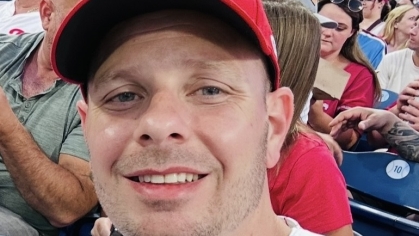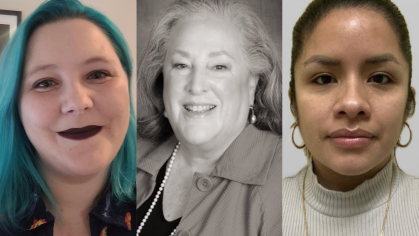The Post-Retirement Voyage: A Couple's Philanthropic Journey through Lifelong Commitment to Change
Maury Lieberman SSW'66 and Leslie Scallet spent their formative years participating in the fight for civil rights and other progressive causes. While their commitment to social justice propelled them onto different career paths, their lives eventually converged at an organization in Washington, D.C. As their journeys entwined, Maury and Leslie developed a shared vision for spending their retirement years championing causes that have a common mission: creating a defined impact on the world.
Maury Lieberman grew up in the 1950s in Milwaukee, where his father was involved in progressive Wisconsin politics. In the mid-50s, his father took a chance on a new business and moved the entire family to Houston, at that time a small, segregated Southern city. There he witnessed far more overt displays of prejudice, racism, and injustice than he had ever seen before. The only Jewish student in his segregated Texas high school of 2,500, Maury felt like a fish out of water. “They were traumatic teenage years,” he recalls. Quiet support from some teachers and community members taught him never to generalize about any group or environment.
Meanwhile, nearly 800 miles away in Clayton, Missouri, Leslie Scallet was experiencing her own set of challenges growing up in the same decade. She excelled in school, but girls were not expected to pursue careers outside of teaching or other female-dominated jobs. “Since I had good grades, I could aspire to teach high school, but no other options were mentioned,” she says with a sardonic chuckle.
Devastated by the injustices he encountered as a young man, Maury looked for opportunities to change the world. He knew his greatest chance at making an impact would be through education, so he enrolled in the sociology program at the University of Wisconsin at Madison – “the Berkeley of the Midwest,” as he describes it. Maury joined in progressive causes and learned what he needed to do to support them. Upon graduation, his extended family expected him to apply for law or medical school, but Maury had different plans. “I always wanted to go to school in the East, and Rutgers School of Social Work offered me a scholarship,” he says.
Despite the distance, he moved across the country and became a social work student at Rutgers. Just one of two community organization students – the others in his cohort studied casework and group work – Maury fully immersed himself in his studies and field work, receiving a hands-on education in how to effect change.
Leslie also became intent on changing the world, taking the message in John F. Kennedy’s famous presidential inauguration speech as a call to action. “There was a lot of attention to improving the world in the 1960s, and a lot of people were going to law school to do just that,” she says. After studying history at Washington University in St. Louis, she decided to pursue a career in law. Encouraged only by her father, Leslie went on to earn her J.D. at the University of Pennsylvania.
Looming in the background of Maury’s post-graduation life was the Vietnam War, so he chose to continue studying and received an education in urban and regional planning at the University of Pittsburgh School of Public and International Affairs. After graduating, he joined the U.S. Public Health Service, receiving a Navy lieutenant’s rank, and was assigned to a civilian post at the National Institute of Mental Health (NIMH) in Washington, D.C.
Despite her academic achievements, Leslie was influenced by the social expectation that a woman with a law degree in the 1960s was unlikely to find success on the traditional career path of a lawyer. Law firms “wouldn't have me up front with clients because they would not accept a female lawyer,” she explains. Believing her chances of conventional success were low, she decided instead to follow her passion for social justice. Introduced in law school to mental health as a new area of focus in the civil rights movement, she took a job at the NIMH working as a special assistant to the director of the Institute, a psychiatrist who was one of the first to recognize the importance of patients’ rights in the mental health system.
At NIMH’s Center for Studies of Metropolitan Mental Health, Maury developed non-traditional mental health initiatives. With his diverse educational background, he excelled in his job collaborating with other interdisciplinary thinkers. “The center was the vanguard, and everyone thought we were off the wall,” he says with a laugh. “Even our office arrangement was different – a big open space where we sat on the floor or on beanbags.”
Maury and Leslie felt fortunate to have careers that provided them the freedom to think differently and deepen their understanding of mental health. And although they worked for a time in the same organization, and in the same field for nearly two decades, Maury and Leslie only knew each other informally, seeing each other infrequently. But eventually, they developed a relationship, growing close and marrying. They both went on to other jobs later in their careers and decided to retire in the late 1990s. Unlike many new retirees, Maury and Leslie were busy, serving as activists, consultants, and board members for local, national, and international organizations.
After spending years supporting several disparate causes, Maury and Leslie realized they needed to formalize their efforts and determine if their time and resources were being used to their fullest extent. They took some time to reflect on their education and work, finding that one of the greatest lessons they learned was the importance of meeting the client where they are. A foundation of social work practice, this idea would become one of the guiding principles of their philanthropic efforts. During a meeting about their support, Rutgers School of Social Work Dean Cathryn C. Potter prompted the couple to write down the purpose of their philanthropy. “It was the first time Leslie and I stepped back and reflected on our philanthropic efforts. It was not easy because we made a lot of assumptions since we share values,” Maury explains.
While traveling on a ship to the Philippines to visit one of the organizations they supported, Maury and Leslie crafted a document to explain their philanthropic philosophy and goals. They called the document “Voyage,” a nod to their time at sea, but also to their constant evolution and desire to continue learning along their philanthropic journey. With limited resources and so many good causes in need, Maury and Leslie also had to choose which organizations to support. They decided to work only with groups that provide real and measured success and also employ people that truly understand their philanthropic values. “We want to be engaged in the organizations we support in some way, whether it's advisory, participatory, or faciliatory, so we can use our accumulated wisdom and skills. But we don’t want to control things and come in and say things have to be done a certain way,” Maury says.
Recently, the couple chose to support travel and educational experiences for Rutgers School of Social Work students specializing in management and policy. Their inspiration comes from a desire to foster student activism and heighten policy awareness. “We believe social workers need to understand policies because a lot of societal problems are the result of them,” Maury says. “Social workers have a role in solving their clients’ problems by changing policy rather than just by accommodating to the policy that's there. Social workers are often pigeonholed, but I always make it very clear that part of my ability to do the work I’ve done throughout my life is because of my social work education.”
For Maury and Leslie, who have spent more than two decades on their philanthropic journey, learning from both success and failure and finding collaborators they can trust have become guiding principles. “You have to be honest about what you do and don’t know and admit to the possibility that you may not even know what you don’t know. And you have to find the right people to help you understand how to be effective,” they say. It’s this idea that has helped them fulfill their shared desire to create change in the world.



